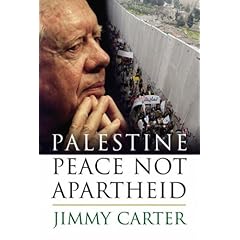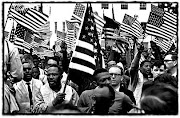 An abstract concept such as Peace seems remote for Palestinians living in carved up territories with a profound inability to negotiate with one voice on any subject. God's Land of Three Faiths is rife with Palestinian versus Palestinian, Hamas against the remnants of Arafat's Fatah, the Islamic Jihad and now the killing of Palestinian Christians under the meager authority of a Palestine's president, Mahmoud Abbas, that can speak to Israel's prime minister, but not in full to his own scattered bitterly divided people. It is an ominous harbinger of what may/will happen to the internal politics of Palestine when they attain the status of a nation state. Today, some in Palestine spoke with a sophisticated weapon rather than words of Peace by launching a rare Russian made Katyusha rocket into Israel. (AFP photo from Oct 5 Jerusalem Day March)
An abstract concept such as Peace seems remote for Palestinians living in carved up territories with a profound inability to negotiate with one voice on any subject. God's Land of Three Faiths is rife with Palestinian versus Palestinian, Hamas against the remnants of Arafat's Fatah, the Islamic Jihad and now the killing of Palestinian Christians under the meager authority of a Palestine's president, Mahmoud Abbas, that can speak to Israel's prime minister, but not in full to his own scattered bitterly divided people. It is an ominous harbinger of what may/will happen to the internal politics of Palestine when they attain the status of a nation state. Today, some in Palestine spoke with a sophisticated weapon rather than words of Peace by launching a rare Russian made Katyusha rocket into Israel. (AFP photo from Oct 5 Jerusalem Day March)Katyushas, widely used by Hezbollah guerrillas to strike Israel from Lebanon in a 2006 war, can reach a distance of 20 kilometres (12 miles).
An Israeli army spokesman said Israel held Hamas responsible for the Katyusha attack. "Hamas bears responsibility for all the terror attacks emanating from the Gaza Strip regardless of who actually fired the rocket," captain Benjamin Rutland said.
Israeli Defence Minister Ehud Barak has said Israel is considering a sweeping military operation in the Gaza Strip to counter the almost daily rocket salvoes. Israel also has threatened to cut power it supplies to the territory unless the attacks ceased.
With a U.S.-sponsored Middle East conference expected to be held next month, Israel has so far stuck to limited ground raids and air strikes against militants.
 Frustration is fuel for further escalation and the frustration in Palestine is split between internecine internal political fights, Gaza and other segregated territories and a perpetual fight with Israel about what to return to the negotiating table with in exchange. Meanwhile, the Middle East Peace process is undercut by a Bush administration that went blind to its diplomatic responsibilities by occupying Iraq and with petty namecalling of other nations in the region. There are no more honest brokers with America's former stature to bring the factions and nations to the table for intense negotiations. Bush is not regarded as a bringer of Peace and defines himself as a War president by using preeminent strikes in America's national interest while stubbornly refusing to negotiate with enemies.
Frustration is fuel for further escalation and the frustration in Palestine is split between internecine internal political fights, Gaza and other segregated territories and a perpetual fight with Israel about what to return to the negotiating table with in exchange. Meanwhile, the Middle East Peace process is undercut by a Bush administration that went blind to its diplomatic responsibilities by occupying Iraq and with petty namecalling of other nations in the region. There are no more honest brokers with America's former stature to bring the factions and nations to the table for intense negotiations. Bush is not regarded as a bringer of Peace and defines himself as a War president by using preeminent strikes in America's national interest while stubbornly refusing to negotiate with enemies.
The US has called for a conference and Hamas & Jihad are scheduling a separate forum. The word conference is to re-establish connections before moving along the spectrum to negotiations. There are 15 barren months left in Bush's mendacious presidency and until the goodwill may begin again. Peace in the Middle East is the size of a mustard seed left unplanted, as the ground is not yet ready, nor is the growing season upon us, let alone should any Peace farmer expect a plentiful harvest this year.
Palestine has an economic crisis that is hampered by the lack of exporting goods, providing services or any trade with other nations. No Palestinian has means of making consistent money next door to a thriving economy in Israel. The haves versus the havenots."Any public or official conference without the participation of president Abu Mazen and the executive committee of the PLO is illegal," said Fatah spokesman Ahmed Abdelrahman in a statement. "Our Syrian brothers cannot accept any conference against the PLO."
Most of the international community recognises the PLO, headed by Abbas, as the sole legitimate representative of the Palestinians.
Washington had called the autumn conference amid its increased efforts to jumpstart stalled peace talks between the Israelis and Palestinians but no date or venue has been confirmed.
 Nobel Peace prize winner Jimmy Carter set off a needed firestorm in America with his book title, Palestine: Peace Not Apartheid. Getting past that, inside there are eloquent words ringing with truth as he discusses the daily conditions from a Palestinian perspective that lead to violent outbreaks and their endorsement of those terrible tactics. The former president does not abide the violence nor condone it as part of a tactic, instead he focuses in a factual manner on what leads to the pathology and that is what makes it very worth the read. It's an excellent book that caused controversy and hurt feelings, yet explains from one perspective what the price of Peace is about for Palestinians.
Nobel Peace prize winner Jimmy Carter set off a needed firestorm in America with his book title, Palestine: Peace Not Apartheid. Getting past that, inside there are eloquent words ringing with truth as he discusses the daily conditions from a Palestinian perspective that lead to violent outbreaks and their endorsement of those terrible tactics. The former president does not abide the violence nor condone it as part of a tactic, instead he focuses in a factual manner on what leads to the pathology and that is what makes it very worth the read. It's an excellent book that caused controversy and hurt feelings, yet explains from one perspective what the price of Peace is about for Palestinians.










No comments:
Post a Comment